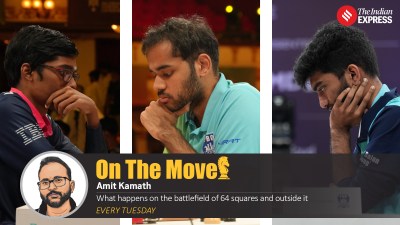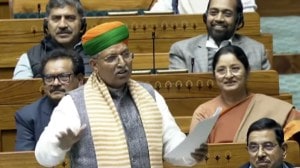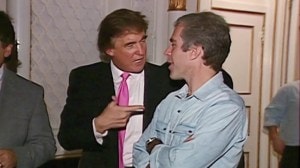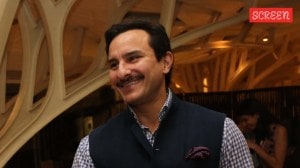The Art of Reading a Movie
They only have words,but screenplays are such marvellous palimpsests of films
When you see a film,you hear people speak. You watch them move. One moment they are in the middle,the next theyve vaulted across to the side,and the next they are gone,poof. But you know,like youve always known,that those characters youve pledged a couple of your hours to,havent left. They are waiting on the sidelines. To turn up again. To leave again. Speaking,singing,fighting,crying,laughing. Being alive,dying. Taking us with them where we want to go,or where they want to take us. It is a multiple engagement of senses,in a never-ending,joyous loop.
The arc of those characters,the ones that we are experiencing for the very first time,is one that has been preordained. In the screenwriters brain. The words have tingled down his or her spine,come dancing down the wrists to the tips of the fingers,to become finite. Those words have then done the transfer,to play on the screen.
To realise just how this process happens,take a look at any screenplay. What you will find is a unique roadmap of a movie: how it began its life,how it went on from there and how it finally unspooled. A new book,Original English Film Scripts by Satyajit Ray,and a recent one,The Dialogues Of Pyaasa,show us how a couple of cinematic geniuses worked to make words sing and soar.
Sample this,as a quick reckoner.
Zenana.
Khurshid: Maqbool,is the master back?
Maqbool: Yes,Begum Sahiba
Khurshid: Is he alone?
Maqbool: No,Begum Sahiba,his friend is with him.
Khurshid suspicion growing: Are they playing?
Maqbool: Yes,Begum Sahiba
Khurshid: What are they playing?
Maqbool: Shatranj,Begum Sahiba
What youve just read is an excerpt from the script of Shatranj Ke Khiladi,in which Khurshid is the irate,frustrated wife of Mirza. He is besotted,not with his beautiful wife,but with the game of chess,which he plays endlessly with his friend Meer. Satyajit Rays classic foregrounds these chess-playing,pleasure-seeking,laid-back nawabs as a fitting metaphor for their times the British were slowly and insidiously taking over India and the nawabs of Awadh were fiddling while their country burnt.
Scripts-as-books are a great introduction for those who havent seen the films. If you have,the screenplay brings it back to you,makes it all come alive,in glorious Technicolor or lambent black-and-white,as the case might be. Shabana Azmi,who plays Khurshid,had a tiny part,but the neglect her husband showered on her was of a piece with the disdain the rich,slothful nawabs had for those who did not understand their urgency to push pieces of chess around all day long. Everyday.
Guru Dutts immortal film Pyaasa was rendered thus by its story based on a short story,Kash-m-kash,that Dutt himself wrote and its dialogue written by Abrar Alvi. In The Dialogues Of Pyaasa,Nasreen Munni Kabirs foreword and detailed postscript add to the sheer enjoyment of reading the lines that belonged to the characters. I cant quite make up my mind on whose lines I love the most. There is Gulaab,the working girl who lures the brilliant but so-poor-he-cant-afford-a-meal poet Vijay. Then there is,of course,Sattar the masseur-cum-mystic man whose song Sar jo tera chakraye is as much a Pyaasa anthem as Sahirs sombre lines in Yeh duniya agar mil bhi jaaye toh kya hai.
The dialogue is spread out imaginatively across double-spread pages in Hindi,Urdu and transliterated and translated into English,in contiguous columns. Take your pick. It gives you,at a glance,what the original dialogue was like,in beautiful Hindustani a mix of Hindi and Urdu which has almost died out in our movies; it also gives you an English translation.
Maalish. Tel maalish. Champi.
Massage,oil massage,head massage.
You would prefer,naturally,the first. Because that is what Johnny Walker warbles when he vaults on to the screen. Those are the words that the lyricist dreamt of,that were set to the tune by the musicians,sung by the singer. Maalish,tel maalish,champiiiiiiii the stretching out of the colloquial champi adding to the verve of the song. The English version loses all its charm in translation,but it serves the useful purpose of letting non-Hindi speakers access the dialogue easily.
Dutt worked on someone elses script and dialogue,but you can see his imprint all over Pyaasa. Alvi and he,good friends through their life,were completely in sync with each other. The fact that Dutt played the lead character adds to the whole: another actors Vijay would have been completely different from the poet Dutt made him. But so closely are Vijay and his memorable dialogue and songs entwined that you cant think of anyone else in that role.
Rays screenplays,collectors items all,have margins that are filled with delicate,astonishingly well-drawn sketches,and precise directions and descriptions. The pages are like palimpsests: you can actually see the film the script is going to turn into. Two,a three-page screenplay of a short film,is a brilliant example of how Ray worked. Its about two boys,one rich,the other poor,and the short-lived interplay between them,which tells us about their lives without the two exchanging a single word or sharing a single frame.
The volume has,apart from Shatranj Ke Khiladi,several other screenplays and a wonderfully acerbic chapter on how Ray nearly worked with Peter Sellers in a Hollywood production: of course,it didnt happen,leaving Ray with a brief distasteful insight into how things worked or didnt in Los Angeles. He writes: Since no one walks in LA you can be held up for vagrancy if you do there was plenty of time to sit alone in the cottage and wonder where all this bizarrerie was leading to. Clearly,bizarrerie is a Ray coinage: you may never have heard it before,or after,but you know exactly what Ray means.
You want to see how words turn into movie magic? Look no further.
- 01
- 02
- 03
- 04
- 05































